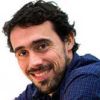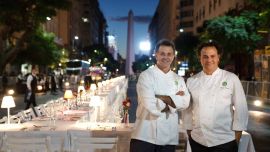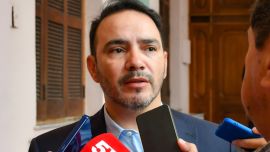Marcelo Figueiras, the president and owner of Laboratorios Richmond, is discussing the pharmaceutical firm’s manufacturing of the ‘Sputnik VIDA’ coronavirus vaccine in Argentina.
Under his leadership earlier this year, Laboratorios Richmond succeeded in signing an agreement with the Russian Direct Investment Fund, representing the Gamaleya Research Institute, to manufacture the first Latin American version of the Sputnik V vaccine against Covid-19.
“One of the issues which we discussed with President Alberto Fernández when he came to our plant was the need for Argentina to achieve health sovereignty,” the 57-year-old told Fortuna in an interview.
Laboratorios Richmond is a company financed with national capital, dating back 90 years. Figueiras purchased it more than three decades ago. He has developed his business in the pharmaceutical sector with a portfolio of over 80 products with the focus on the antiviral treatment of AIDS, as well as oncological (against cancer), cardiometabolic and neuropsychiatric drugs. And now he’s going for the Russian vaccine.
In the current global pandemic context, which adds to Argentina’s political and economic uncertainties, there have not been many investment announcements from the private sector.
“You invest in the country because you’re from here. The authorities of other countries called us up when they found out that we were thinking of investing that sum of money – from Paraguay, Uruguay, even Qatar. The whole world is looking for investments but the reality is being here and your children being here,” he says.
“In Argentina we have a health system which is spectacular. Of course, the hospitals need improving and we have to continue investing but we have a system with world-class professionals. We are investing because we consider it fundamental to acquire health sovereignty,” explains Figueiras.
When do you think that Laboratorios Richmond will be able to market Sputnik V in this country?
Our horizon is a year. We’ll have to see how time goes by and make adjustments but we’ve proposed to launch it within a year. It’s not simple and internally we’re trying to accelerate and adjust as best we can, but the world context doesn’t facilitate the situation and many elements are limited due to the international trade difficulties affecting production.
For that reason it is fundamental to understand and increase awareness that the vaccine is important, but only one more factor complementing the precautions everybody must take.
These international trade difficulties have also made many European countries, apart from the United States, start integrating processes which had been outsourced to external markets such as China and India. Do you think that world production is changing?
If there is one lesson which the pandemic has left us, it is that we have to attain self-sufficiency in critical inputs and today that is being seen most clearly with the vaccines. The countries vaccinating are those which produce vaccines, while those who do not produce have to wait. And that is happening even with the risk that not vaccinating the periphery [such as us] also harms the central countries.
The lesson which that leaves us – and the central countries have understood that very well – is that you have to acquire health sovereignty. Make no mistake, health sovereignty does not mean we have to shut up shop or live off our own. Not only is that a utopia but I consider integration with the world to be fundamental. Nevertheless, some things are strategic, you have to define them clearly and then maintain them constantly.
Don’t all the changes in macroeconomic policies work against your long-term vision?
Long-term policies without fluctuations are necessary to permit the development of our industry and others. We cannot have governments changing constantly, opening up and then shutting down. Clear, long-term policies are needed.
Concretely, which long-term policies does the pharmaceutical sector need?
The vision of our industry is to ensure the access of patients to treatment. In this day and age treatment is increasingly specific and geared to the individual pathology of each patient and increasingly expensive. To give an example, our lab placed on the market a product for the treatment of hepatitis B which cost around US$1,500. Until then the only treatment available was worth over US$110,000. What we need, then, is for those who invest and develop products in the country to be looked after. But not via protectionism or privileges but by ensuring competition in equal conditions.
Now that you’re going to produce Sputnik V, how do you analyse the controversy surrounding this Russian vaccine?
Chile has vaccinated a lot of people with most of the vaccines coming from China. When they started inoculating, the test results were still not out. Imagine what would have happened here, all the scandal.
In this sense I’ve always said that Argentina has the Instituto Nacional de Medicamentos and AMNAT [Argentina’s equivalent of the Food & Drug Administration] which are the best in the world, irreproachable professionals with many years of experience bringing calm to consumers and the labs regarding the medicaments and the development of each one.
When I saw that they went to Russia, I said that whatever they say in the Institute and AMNAT is going to be correct. I always said that and finally some very positive results were published at international level.
Apart from producing the vaccine, what is the next step in your lab strategy?
The most important thing is to go regional. We’re already looking from Mexico downwards and the biggest challenge is Brazil because it is very competitive and has internal economies of scale which make it difficult to enter that market. All the same there are some Argentine labs with a very good position there and we’re already selling there with a local partner, as well as in North Africa and Southeast Asia.
In this sense, our objective with the new plant is to qualify for Europe. This forms part of our five-year plan. Of the US$80 million we have already invested nearly half in the development of new products, biotech and clinical studies. Furthermore, there is the plant, in which we will be investing US$15-20 million more. This investment also shows that we are here to stay.
What we are hoping for is some company from the macro-economic. I believe that if we reach an agreement with the International Monetary Fund and commodity prices keep rising and if the incipient recovery takes hold and gathers steam, the macroeconomic could accompany us.



















Comments